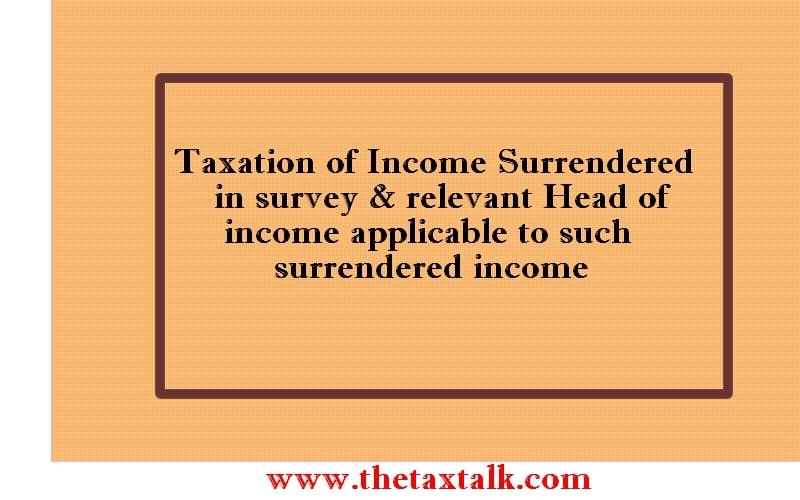![]()
Taxation of Income Surrendered in survey & relevant Head of income applicable to such surrendered income
Short Overview Income declared in survey is to be taxed and it has to fall under one of the heads of income, i.e., business income and, therefore, is available for set-off against the business loss. In instant case, during survey, an income was surrendered and added in the income of assessee and consequent business loss was claimed, therefore, such income would be available for set-off against the business loss. Furthermore, the provisions of section 115BBE would not apply in instant case, as the same were prospective and not retrospective in nature
A survey under section 133A was conducted in business premises of assessee. Consequent to survey, an amount of Rs. 75,00,000 was offered as business income. Further, a revised return was filed declaring loss after adjusting the loss originally returned in original return of income. AO invoked provisions of section 115BBE read with section 69C and made addition of Rs. 75,00,000 due to non-availability of bills or evidences to support the purchases. Accordingly, the expenses relating to purchases were disallowed by invoking provisions of section 115BBE read with section 69C. Assessee submitted that the expenditure of purchase once shown by it in its regular business accounts, the source was obviously explained. Once source was explained, provisions of section 69C could not be invoked. It was further submitted that the provisions of section 115BBE were brought on the statute book w.e.f. 1-4-2017 and the relevant assessment year involved was 2008-09, therefore, the said provisions would not apply in the assessee s case.
It is held that Provisions of section 115BBE had been brought into the statute book w.e.f. 1-4-2017 by the Finance Act, 2016 and a beneficial circular had been issued by CBDT vide Circular No. 11 of 2019, dated 19-6-2019, wherein the CBDT clarified the applicability of circular. Even such position had been explained in the explanatory notes to the provisions of the Finance Act, 2016 by CBDT vide F. No. 370142/20/2016-TPL, Circular No. 3/2017 dated 20-1-2017, wherein it had been clarified that the amendment in section 115BBE would take effect from 1-4-2017 and would accordingly be applied for assessment year 2017-18 and subsequent assessment years. Further, it is settled that income declared in survey is to be taxed and it has to fall under one of the head of income, i.e., business income and therefore, is available for set-off against the business loss. In instant case, during survey, an income was surrendered and added in the income of assessee and consequent business loss was claimed, therefore, such income would be available for set-off against the business loss. Further, it is also settled that the AO cannot deny benefit of section 71, and the AO has to consider the undisclosed income under section 69, but once the loss is determined, the same should be set-off against the income determined under any other head of income. Furthermore, the provisions of section 115BBE would not apply in instant case, as the same were prospective and not retrospective in nature.
Decision: In assessee s favour.
Referred: CIT v. Shilpa Dyeing & Printing Mills Pvt Ltd. (2013) 39 Taxmann.com 3 (Guj-HC) : 2014 TaxPub(DT) 164 (Guj-HC), Dy. CIT v. Radhe Developers India Ltd. 2010 TaxPub(DT) 448 (Guj-HC), CIT v. Chensing Ventures (2007) 291 ITR 258 (Mad-HC) : 2007 TaxPub(DT) 1146 (Mad-HC) and Fakir Mohmed Haji Hasan v. CIT 2001 TaxPub(DT) 0551 (Guj-HC).
IN THE ITAT, CHENNAI BENCH
MAHAVIR SINGH, V.P. & G. MANJUNATHA, A.M.
Hussain Mohideen Ibrahim Sha v. ACIT
ITA No. 449/Chny/2017
16 February, 2021
Appellant by: Y. Sridhar , CA
Respondents by: G. Chandrababu, Addl. CIT
ORDER

